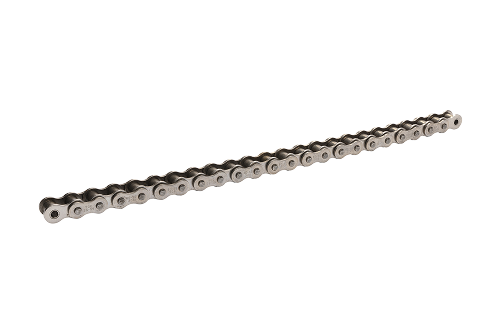Roller chain, also known as a drive chain, is one of the most widely used types of mechanical power transmission chains. It’s a critical component in a variety of industries, found in everything from bicycles to industrial machines and agricultural equipment. But what exactly is roller chain, and why is it so essential?
Understanding Roller Chain: The Basics
Roller chain consists of a series of interconnecting links, each with a cylindrical roller that fits into sprockets. The purpose of the chain is to transfer rotary motion and torque between two or more shafts. It is designed to be durable, flexible, and capable of withstanding high loads and stresses.
Typically made of steel or other alloys, roller chains are known for their strength and reliability. The design allows the chain to move smoothly and efficiently over sprockets, while the rollers minimize friction, helping to prolong the chain’s lifespan.
How Does Roller Chain Work?
Roller chain operates by looping around two or more sprockets. When one sprocket (usually attached to a motor or engine) rotates, the motion is transferred to the roller chain. The rollers on the chain roll along the teeth of the sprockets, transferring power from one sprocket to the other.
The chain links are designed to work together to ensure smooth and consistent movement. As the chain moves, it maintains a tight grip on the sprocket teeth, which ensures the accurate transfer of power, even in demanding conditions.
Why Choose Roller Chain?
There are several reasons why roller chain remains a top choice for power transmission systems:
• Durability: Roller chains are built to last, capable of handling high loads, shock, and heavy-duty applications.
• Versatility: These chains are adaptable for a wide range of applications, including machinery, conveyors, and vehicles.
• Efficiency: Roller chains offer a high level of efficiency in transferring mechanical power, which reduces energy consumption.
• Low Maintenance: With proper care and lubrication, roller chains require minimal maintenance, making them cost-effective over time.
Applications of Roller Chains
Roller chains are used in a broad variety of industries due to their ability to handle tough conditions. Some common applications include:
• Bicycles: Transmitting power from the pedals to the wheels.
• Agricultural Equipment: For tractors, harvesters, and other farming machinery.
• Industrial Machinery: Used in conveyor systems, pumps, and various processing machines.
• Motorcycles and Vehicles: Transmitting power to the rear wheel or other moving parts.
Maintaining Roller Chain
To ensure your roller chain operates at its best, regular maintenance is necessary. Key factors to keep in mind include:
• Lubrication: Applying the right type of lubricant prevents rust, reduces friction, and improves chain life.
• Tension: Proper chain tension is crucial. Too loose, and the chain can slip; too tight, and it can wear out faster.
• Inspection: Regularly check for wear, elongation, or damage to links, as these can lead to failure if not addressed.
At RR Fisher, we offer a wide selection of high-quality roller chains suited to different industrial and mechanical applications. Whether you're looking for a replacement or a new installation, our team can help you choose the perfect solution for your needs.
What is Roller Chain?

